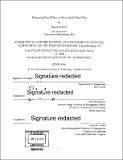Estimating peer effects in networked panel data
Author(s)
Rock, Daniel Ian
DownloadFull printable version (3.495Mb)
Other Contributors
Sloan School of Management.
Advisor
Erik Brynjolfsson.
Terms of use
Metadata
Show full item recordAbstract
After product adoption, consumers make decisions about continued use. These choices can be influenced by peer decisions in networks, but identifying causal peer influence effects is challenging. Correlations in peer behavior may be driven by correlated effects, exogenous consumer and peer characteristics, or endogenous peer effects of behavior (Manski 1993). Extending the work of Bramoullé et al. (2009), we apply proofs of peer effect identification in networks under a set of exogeneity assumptions to the panel data case. With engagement data for Yahoo Go, a mobile application, we use the network topology of application users in an instrumental variables setup to estimate usage peer effects, comparing the performance of a variety of regression models. We find analyses of this type may be especially useful for ruling out endogenous peer effects as a driver of behavior. Omitted variables (especially ones related to network homophily) and violation of the exogeneity assumptions can bias regression coefficients toward finding statistically significant peer effects.
Description
Thesis: S.M. in Management Research, Massachusetts Institute of Technology, Sloan School of Management, 2016. Cataloged from PDF version of thesis. Includes bibliographical references (pages 20-22).
Date issued
2016Department
Sloan School of ManagementPublisher
Massachusetts Institute of Technology
Keywords
Sloan School of Management.